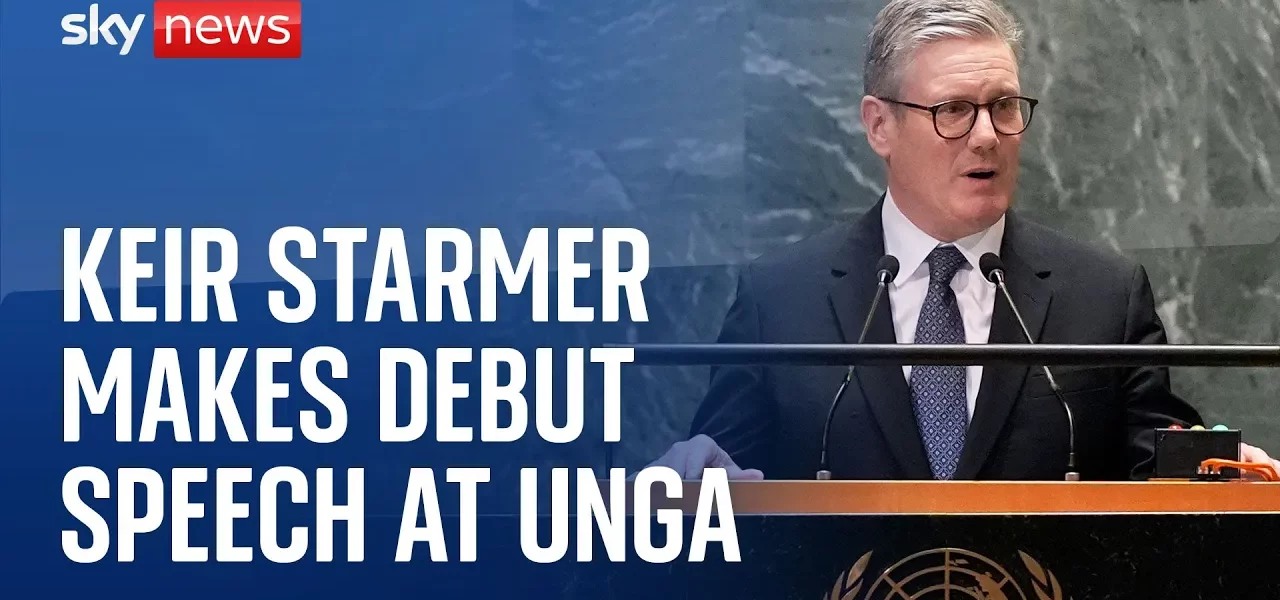Address to the UN General Assembly: A Call for Global Cooperation

In a powerful address to the UN General Assembly, the Prime Minister emphasizes the necessity of international cooperation in addressing global challenges such as conflict, climate change, and humanitarian crises. This article delves into the key themes and messages from the address, highlighting the importance of global leadership and collaborative efforts to foster peace and progress.
Introduction
The Prime Minister’s address to the UN General Assembly serves as a poignant reminder of the critical role that international cooperation plays in safeguarding human rights and promoting peace. Reflecting on the Universal Declaration of Human Rights, the Prime Minister underscores the inherent dignity and equal rights that form the basis of our shared humanity. However, the current global landscape is fraught with conflict and humanitarian crises, necessitating a renewed commitment to cooperation and collective action among nations.
The Impact of Conflict on Global Stability
Today, the world faces unprecedented levels of conflict, with devastating implications for global stability. The Prime Minister outlines how conflicts in regions such as Gaza, Lebanon, Ukraine, Sudan, Myanmar, and Yemen exacerbate humanitarian needs and stall progress in areas such as poverty alleviation and public health.
Historical Context of Conflict
Over the past two decades, significant strides have been made in reducing poverty and improving health outcomes. However, the resurgence of conflict has reversed many of these gains, revealing a catastrophic scenario created by human actions. The political divisions between North and South have intensified, shifting the focus from the rule of law to brute force.
Consequences of Inaction
- Escalation of humanitarian crises.
- Weakening of international cooperation.
- Increased political instability and division.
The UK’s Commitment to Global Leadership
As the Prime Minister articulates, the UK is poised to reclaim its role as a responsible global leader. The address serves as a clarion call for the UK to engage actively in international affairs, emphasizing that domestic success is intertwined with global events.
Redefining National Missions
- Higher growth.
- Safer streets.
- Cleaner energy.
- Increased opportunities.
- A healthier society.
Each of these missions is underpinned by a recognition that the UK’s stability and prosperity cannot be achieved in isolation from global challenges such as war and climate change. The Prime Minister calls for collaborative efforts to address these issues at their roots.
Strategies for Conflict Resolution and Humanitarian Aid
In addressing the rising tide of conflict, the Prime Minister emphasizes the importance of diplomacy and immediate action. The need for ceasefires and respect for international law is paramount in alleviating suffering and restoring peace.
Immediate Actions Required
The address identifies several key actions that must be taken:
- Call for an immediate ceasefire in Israel and Gaza.
- Facilitate the unfettered flow of humanitarian aid.
- Support diplomatic efforts for a sustainable resolution.
Long-Term Solutions
Addressing the humanitarian crisis in Sudan and supporting Ukraine are also highlighted as critical areas for action. The UK’s commitment to international law and support for self-defense under the UN Charter is reiterated as essential to maintaining global order.
Addressing Climate Change and Sustainable Development
Climate change stands as one of the most pressing challenges of our time. The Prime Minister outlines the UK’s renewed commitment to tackle climate change both domestically and on the international stage.
UK’s Climate Initiatives
Key initiatives include:
- Lifting the de facto ban on onshore wind in England.
- Ending new oil and gas licenses.
- Transitioning to clean power by 2030.
International Climate Finance
The UK will continue to lead in international climate finance, supporting biodiversity and climate adaptation efforts in vulnerable regions. The importance of mobilizing private investment to complement public finance is also emphasized.
Reforming Global Institutions for the 21st Century
The Prime Minister stresses the urgent need for reform within global institutions to better address the challenges of today. This includes making the United Nations Security Council more representative and responsive to the needs of the global community.
Key Areas for Reform
Reforms should focus on:
- Increasing representation for developing countries.
- Tackling unsustainable debt issues.
- Enhancing the role of multilateral development banks.
Collaboration and Partnership
The Prime Minister emphasizes a shift from paternalism to partnership, advocating for a collaborative approach in global governance. By fostering equal respect and open dialogue, the UK aims to build bridges in tackling global challenges.
Conclusion
In conclusion, the Prime Minister’s address to the UN General Assembly encapsulates a vision for a more cooperative and peaceful world. By addressing conflict, climate change, and humanitarian crises through international collaboration, the UK seeks to pave the way for a brighter future. It is imperative that nations unite in their efforts to uphold the values of the UN Charter and work towards sustainable solutions that benefit all. Together, we can change the trajectory of global affairs and foster a spirit of cooperation and progress for generations to come.
For further insights into the UK’s international policies and commitment to global cooperation, visit our related articles on international relations and climate action initiatives.
“`




